

Monitoring Mood Stabilizers. Benzodiazepine Indications. Depression Scales .tiff.
Making a Comeback – Mental Health Web Series. Drugs on the brain. Martin Barnes of DrugScope and neuroscientist Professor David Nutt explain the results of research into the effects of recreational drugs on the brain.
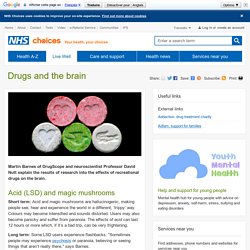
Acid (LSD) and magic mushrooms Short term: Acid and magic mushrooms are hallucinogenic, making people see, hear and experience the world in a different, ‘trippy’ way. Colours may become intensified and sounds distorted. Users may also become panicky and suffer from paranoia. The effects of acid can last 12 hours or more which, if it’s a bad trip, can be very frightening. Long term: Some LSD users experience flashbacks. Cannabis (marijuana, weed, dope, skunk) Short term: People smoke cannabis to relax and get high, but it can make it difficult to remember things, even if they’ve only just happened.
Long term: "It’s possible that cannabis might trigger long-term mental health problems, including psychosis, schizophrenia and depression," says Barnes. Cocaine and crack cocaine Ecstasy (E) Heroin (smack, diamorphine) Ketamine (K) Steroids. Black Dog Institute - Home. Centre for Clinical Interventions (CCI) - patient handouts. Top 10 Patient Handouts for free download by GPs: Please scroll down the page for the rest of our wide range of free resources.
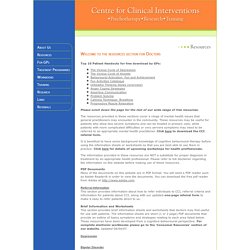
The resources provided in these sections cover a range of mental health issues that general practitioners may encounter in the community. These resources may be useful for patients who show less severe symptoms and can be treated in primary care, while patients with more complicated difficulties or very servere symptoms may need to be referred to an appropriate mental health practitioner. Click here to download the CCI referral form. It is benefical to have some background knowledge of cognitive behavioural therapy before using the information sheets or worksheets so that you are best able to use them in practice. The information provided in these resources are NOT a substitute for proper diagnosis or treatment by an appropriate health professional. PDF DocumentsMany of the documents on this website are in PDF format. Home - Provided by CANMAT. Tools and Resources - CARMHA - Centre for Applied Research in Mental Health & Addiction.
SwitchRx: Switching Antipsychotic Medications. The Centre for Addictions Research of BC (CARBC) Canadian Center for Substance Abuse Resources. Home. Mental Health Resources - Healthy Minds Canada. Below you will find a wide variety of online resources pertaining to many different areas of mental health in Canada.
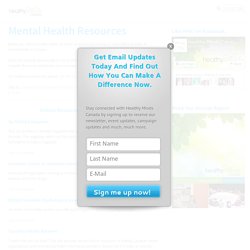
If you are currently experiencing a crisis or emergency situation, please call 911 or contact your local hospital. Resources listed below are not a replacement for emergency care. For additional resources, please visit the Handbook section of our website. Skip to: Disorders A-Z | Online Resources & Organizations | Telephone Resources & Helplines | Books Online Resources and Organizations bp CANADA Magazine This site profiles a Canadian magazine that offers hope and harmony for people with bipolar disorder. Visit the website Canadian Centre on Substance Abuse A non-profit organization working to minimize the harm associated with the use of alcohol, tobacco and other drugs. Visit the website British Columbia Psychological Association An online tool to help connect you with psychologists in British Columbia, Canada. Visit the website. Neuroscience and Psychiatry Modules. Recent developments in neuroscience can help inform clinicians' understanding of cognition, emotion, behavioral regulation, and social interactions—all critical aspects of people's lives that are dramatically affected in psychiatric disorders.
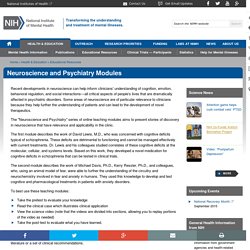
Some areas of neuroscience are of particular relevance to clinicians because they help further the understanding of patients and can lead to the development of novel therapeutics. The "Neuroscience and Psychiatry" series of online teaching modules aims to present stories of discovery in neuroscience that have relevance and applicability in the clinic. The first module describes the work of David Lewis, M.D., who was concerned with cognitive deficits typical of schizophrenia. These deficits are detrimental to functioning and cannot be managed effectively with current treatments. Dr. To best use these teaching modules: Neuroscience and Psychiatry Module 1Translating Neural Circuits into Novel Therapeutics Transcript Transcript. Cornell scale depression in Dementia. Antidepressant Skills Workbook - Table of Contents.
The following is the online version of the workbook.
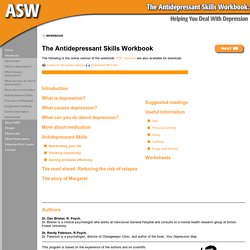
PDF versions are also available for download. Listen to the audio version Download MP3 file Dr. Dan Bilsker, R. Dr. This program is based on the experience of the authors and on scientific research about which strategies work best in managing depression. ASW is intended for: individuals with depressed mood concerned partners, family members or friends who want to help a depressed individual clinical providers that would like to use the manual as an adjunct to their treatment This book is meant to provide accurate information about depression.
Funding for this book was provided through grants from the Ministry of Health, and BC Mental Health and Addiction Services, an agency of the Provincial Health Services Authority, province of British Columbia, Canada.